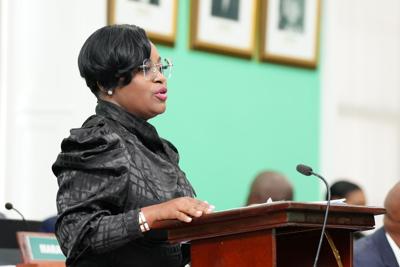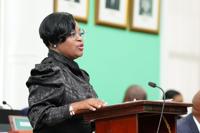The Electricity Bill, 2024, tabled in the House of Assembly yesterday, would empower Bahamas Power and Light (BPL), or any electricity supplier, to set their own tariff rates for three years without approval from the Utilities Regulation & Competition Authority (URCA).
Minister of Energy and Transport JoBeth Coleby-Davis also tabled the Natural Gas Bill, 2024, which would permit URCA to grant expedited approval for a license to conduct natural gas activities in The Bahamas to an existing qualified operator.
Leader of Government Business in the House of Assembly Wayne Munroe said the bills will be debated next Wednesday.
The Electricity Bill, which repeals and replaces the existing Electricity Act, seeks to modernize and consolidate the law relating to the supply of electricity in The Bahamas.
The bill notes that once passed it will come into force on June 1, 2024.
For a period of three years after the commencement of the bill, URCA “shall adopt and apply the tariff rate for any public electricity supplier or authorized public electricity supplier”.
In short, an electricity supplier could set what it charges consumers without regulatory approval. Currently, BPL must apply and get URCA’s permission to change its tariffs, as well as its fuel charge.
This bill suspends that for three years. There hasn’t been a tariff increase in over a decade.
Under the bill, the minister responsible for energy may by order also, for a period of three years, “adjust the tariff rate for electricity services for any public electricity supplier, based on the need for a tariff rate relief for a category of persons as stated in the order”.
Essentially, the minister could set lower or higher tariffs for certain categories of people, which can be a tool to provide social assistance relief.
In March, The Nassau Guardian learned and reported that the Davis administration is planning to enter into a public private partnership with local and foreign elements to manage the transmission, distribution and generation of electricity at BPL.
The government is seeking to lay the legislative framework ahead of the deal.
Under the Electricity Bill, URCA could grant licenses for entities to generate, transmit, distribute or supply electricity in the country.
Any entity seeking a license must be a legal entity incorporated in The Bahamas; conduct the administration and management of its business from The Bahamas; and demonstrate that it can provide electricity services.
URCA, upon review of an application, could within 30 days approve or reject an application or request additional information.
A licensee could enter into a management contract with a system operator for the management and operation of GTDS (generation, transmission, distribution and supply) services.
Those services could include the operation, maintenance and upgrade of GTDS facilities; undertaking improvements needed to achieve the development of new transmission and distribution facilities; management of billing, collection and customer relations for all retail sales of electricity; and street lighting.
The bill notes that no person shall enter into a management agreement without a license from URCA. Further, no person shall undertake the management of generation, distribution, transmission or supply, unless licensed by URCA.
The bill also notes that URCA may issue regulations to govern the use of artificial intelligence in the electricity sector.
The Natural Gas Bill, 2024, seeks to provide for a framework to govern the importation, regasification, storage, transport and retail of natural gas in The Bahamas.
URCA will also act as a regulator of this sector and grant licenses.
Where a company has been engaged in natural gas operations in a jurisdiction outside The Bahamas for no less than five years and operates under regulatory standards within a jurisdiction approved by URCA, it may be granted expedited approval within 21 days of a written request to URCA.
An approval must be made within 12 months of the commencement of the Natural Gas Bill, which would take effect June 1, 2024.
Speculation over BPL’s future was raised in March.
Bahamas Power and Light (BPL), Bahamas Electrical Workers Union (BEWU) President Kyle Wilson said his members were in a state of “panic and fear”.
Prime Minister Philip Davis, who later met with both leaders of BPL’s unions in March, said that his administration does not intend to privatize BPL.
“We will bring in some strategic partners for the purposes of being able to find the necessary funding that we the government don’t have to arrest some of the issues that we have. It’s a lot of money that’s required to fix BPL,” he said.
“We have to find innovative and creative ways to get that done.”



(0) comments
Welcome to the discussion.
Log In
Keep it Clean. Please avoid obscene, vulgar, lewd, racist or sexually-oriented language.
PLEASE TURN OFF YOUR CAPS LOCK.
Don't Threaten. Threats of harming another person will not be tolerated.
Be Truthful. Don't knowingly lie about anyone or anything.
Be Nice. No racism, sexism or any sort of -ism that is degrading to another person.
Be Proactive. Use the 'Report' link on each comment to let us know of abusive posts.
Share with Us. We'd love to hear eyewitness accounts, the history behind an article.